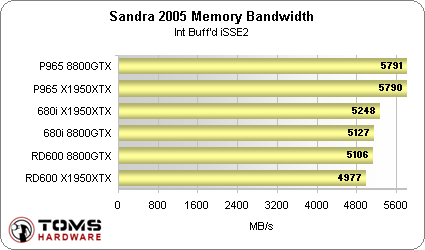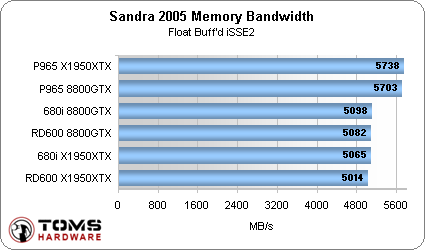Does Chipset-to-GPU Matching Matter?
Synthetic, Continued
Sandra's CPU Arithmetic and Multimedia benchmarks show the MSI Intel chipset motherboard leading with either the ATI or Nvidia card, and Nvidia's chipset doesn't seem to mind at all which graphics card it uses. The ATI chipset usually favored ATI graphics, but never really stood out in a way that might point to a cheat.
Big numbers for Intel's memory controller put both Nvidia and ATI chipsets to shame, but speaking of the latter two, neither showed a consistent preference for configurations containing own-brand graphics cards.
Conclusion
The benchmarks consistently show inconsistency between graphics and chipset performance, so brand matching of graphics cards to chipsets doesn't seem to matter at all. If you're not concerned about SLI or Crossfire, your card selection is as simple as picking the best card available for the money, while you can rest easy in the knowledge that mixing these imparts no performance penalty. This is great news for anyone who upgrades one part at a time.
Another thing that stood out was Intel's greater number of wins using its "mainstream" chipset, which was especially noticeable in Sandra's Memory bench, even though the particular motherboard chosen was forced to use CAS 5 while the others used CAS 4 latency setting. As Intel gets friendlier with Nvidia following the ATI/AMD merger, Nvidia might be persuaded to allow SLI mode for Intel chipsets, but only time will tell.
Core 2 processor buyers looking forward to an R600-based Crossfire solution are currently limited to Intel's ancient 975X and ATI's yet-to-mature CrossFire Xpress 3200 chipset. However, they too can also rest assured that their "old" PCI-Express graphics card will carry them through to release day, regardless of whether the carried-over card is based on ATI or Nvidia technology.
Join our discussion on this topic
Get Tom's Hardware's best news and in-depth reviews, straight to your inbox.


